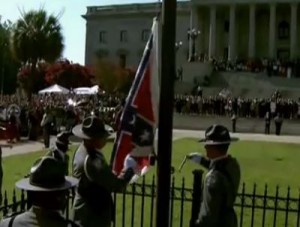A Deep Appreciation for History
Yesterday, as I listened to news reports about the Confederate Flag being removed from the South Carolina State capitol building, I could not help but remember President Obama’s eulogy for the Reverend Clementa C. Pinckney in which he expressed concern that too often we act as if “those who disagree with us are not merely wrong but bad; where we shout instead of listen; where we barricade ourselves behind preconceived notions or well-practiced cynicism” before quoting the Reverend Pinckney’s observation that “Across the South, we have a deep appreciation of history — we haven’t always had a deep appreciation of each other’s history.”
As an historian, I have been especially concerned about the polarized approach to dialogues that are taking place in the American public sphere; not just about the Confederate flag but around a whole host of other issues. Too often, we do not acknowledge that those who disagree with us might be acting in good faith or that they could be good people who happen to be wrong on an issue.
I have heard many news reports during the past few weeks claiming that, for some people, the Confederate flag is a symbol of family heritage honoring relatives who fought in the Civil War while others see the Confederate flag as a racist symbol. Because of the false dichotomy that is typically presented, it is not possible to recognize that the Confederate flag is both and that its meaning has changed over time.
On the 25 April 1866, a group of Confederate women who were decorating the graves of Southern soldiers who had died at Shiloh also decorated the graves of their Northern enemies. For years, it was Southern historical societies who defined the meaning of the Confederate flag in memorial services and during heritage days. It is a history that ought not be denied. But it cannot be denied that the Confederate flag as adopted by the KKK and white supremacists is a racist symbol. The historical evidence is irrefutable.
In his C-Span book talk inspired by The Confederate Battle Flag: America’s Most Embattled Emblem, John Coski details the various meanings of the Confederate flag before concluding that there is a significance difference between placing the Confederate flag on the grave of a Civil War soldier and hoisting the flag as part of a Klan rally. Acknowledging that significance requires that we have the willingness to listen and to learn from each other.
I am aware that many of the people who opposed the decision to remove the Confederate flag from South Carolina’s capitol were motivated by racism and wish to promote white supremacy. Yet, I also recognize that there are people of good faith who are interested in remembering the heritage of their ancestors; a heritage that includes more than promoting slavery.
The historical record clearly demonstrates that the Confederate flag was raised over the South Carolina state capitol on 11 April 1961 as a means to promote a segregationist ideology and as a symbol of opposition to Federal civil rights legislation. As such, the decision to remove the flag seems very appropriate. But does that mean that historic re-enactors are promoting segregation and opposing civil rights when they display the Confederate flag?
I often encounter good students who know and appreciate their history very well. However, many of these students need to come to a greater appreciation of the historical record. Even students who are well versed in nineteenth century American history are sometimes unaware that there were free blacks living in the south, slaves living the in the north, free people of African descent who owned slaves, or slave states who did not secede from the union during the Civil War. They are surprised to learn that, in 1859, the first book published in America by an African American focused on northern racism; not slavery.
I am not being critical of these students whom have done an impressive amount of work over several years to develop their knowledge. I have found that the students willing to put such effort into their educations tend to be those that are the most willing to have their worldviews challenged. They are the ones most willing to appreciate the historical perspectives of other people.
In the classroom, I am frequently challenged by my students and have become a better historian and professor by listening to them. I also challenge students to be better scholars. In a democratic society, we cannot be complacent in appreciating our own histories while not appreciating others’ histories. Such complacency gives credibility to simplistic memes that promote the position that those who disagree with us are not merely wrong but bad; that encourage us to shout instead of listen; that cause us to barricade ourselves behind preconceived notions and well-practiced cynicism.
- –Steven L. Berg, PhD



Bob,
I appreciate your observations and agree that your questions are difficult to answer. And I don’t have answers for them.
My main concern is not the Confederate flag per se, but with our seemingly diminishing ability to ask/discuss difficult questions. When we deal with and all or nothing rhetoric that defines those who disagree with us as evil, it becomes impossible to discuss “Can we separate the battle flag from the cause in honoring those who fought for the South?” Yet it is an important question; maybe one of the most important questions we could be asking right now.
Unfortunately, too much of what passes for political discussion today does not promote dialogue or a path to finding answers for difficult questions.
Within the past few months, a student got into trouble for placing an image that incorporated a swastika on his dorm bulletin board. Many could not separate the swastika from Nazi ideology even though the image was from the Hindu tradition from which the swastika originated. The student was eventually cleared of wrongdoing after a period of dialogue. But what happens if we are unable to have dialogue?
Steve